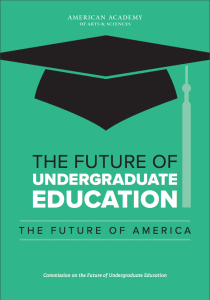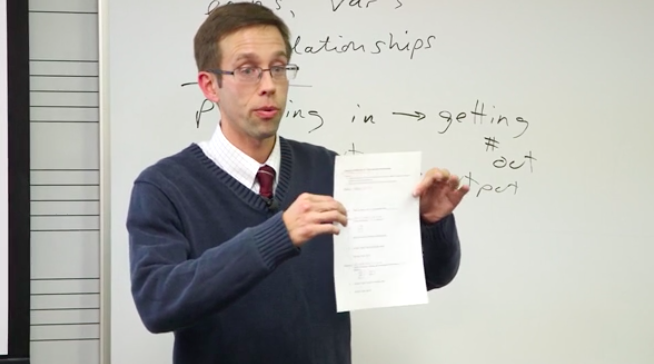
News Roundup: Higher Education Leaders on What 2018 Will Bring
Higher education leaders reveal their perspectives on the college landscape in the coming year, and instructors offer resources for finishing the semester on the right foot.
| Sign up for The Q Newsletter for weekly news and insights. |
Voice of Colleges and Higher Ed Experts
Higher education leaders offer perspectives on and hopes for the college landscape in the coming year. Ideas include creating meaningful career development experiences and fostering an environment that encourages the exchange of divergent ideas. (University Business)
Top Podcast Episodes and Recommended Resources in 2017
Bonni Stachowiak shares the most downloaded Teaching in Higher Ed podcast episodes from the year, naming her discussion with Stephen Brookfield on racial identity in the classroom as a conversation that particularly challenged her. She also lists some of the most-purchased teaching resources her guests have recommended in 2017. (Teaching in Higher Ed)
Peter Eden, president of Landmark College, an institution “designed for students who learn and achieve differently,” calls for the higher education community to recognize the talents and perspectives neurodiverse individuals can bring as students, workers, and agents of change. (The Hechinger Report)
Ending the Semester
This compilation of resources for closing out the semester on a high note includes advice on grading with comments that help students learn, organizing teaching materials, and cutting back the to-do list during break. (ProfHacker)
Framing ‘Failure’ as a Necessary Educational Experience
Students can lose confidence when failure is not recognized as an important aspect of the learning experience. So noted educators convening at Columbia University’s Teachers College for a recent conference entitled “The Success of Failure.” During one panel, Xiaodong Lin described how pointing to “struggle stories” of accomplished individuals like Albert Einstein helps students realize that success is within reach. (Education Dive)
Partner News
Rutgers University-Newark, Miami Dade College, and Arizona State University: U.S. College & University Leaders Launch Presidents’ Alliance on Higher Education and Immigration To Advocate for Dreamers (Rutgers University-Newark)
University of Southern Mississippi: Mississippi Public Universities improve retention rates through focused efforts (Mississippi State University)
Honoring Our Distinguished Educators
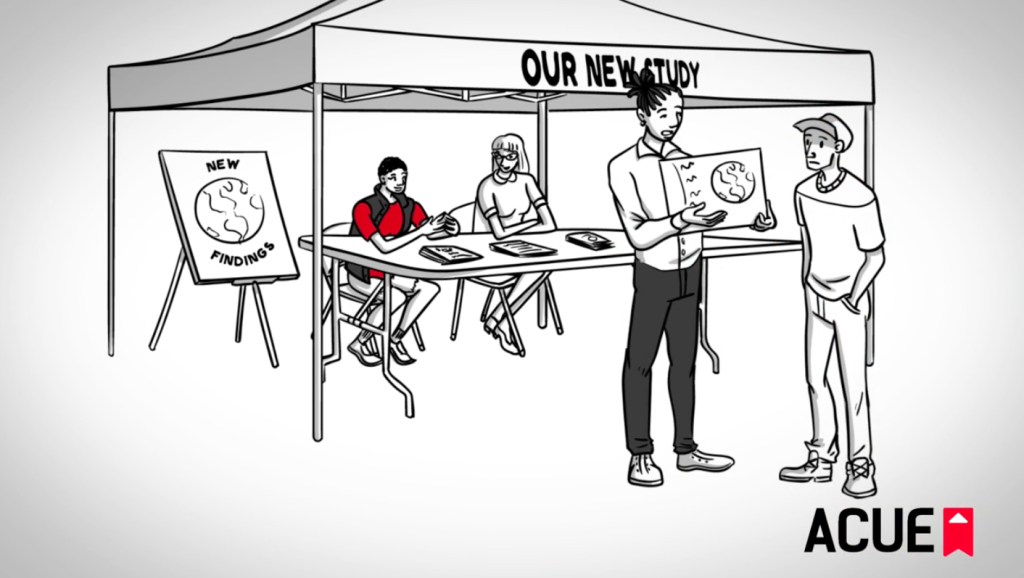
News Roundup: A New Generation of Critical Thinkers
This week, an instructor suggests that part of teaching is preparing students to become critical thinkers and scholars.
| Sign up for The Q Newsletter for weekly news and insights. |
Could Better Teaching Have Helped?
In addition to teaching a particular discipline, part of an instructor’s job should be to prepare students to become capable, ethical, and critical scholars and citizens, David Gooblar writes. He suggests “lessen[ing] the distance between your classroom and the outside world” by inviting students to consider how current events relate to course material. (The Chronicle of Higher Education)
Lecture, Attention, Recall … It’s Complicated
According to John Warner, information recall is not synonymous with learning. Rather than use lectures to impart detailed information, he writes, instructors should use lectures to prompt student reflection. (Just Visiting)
Let Your Students Say “I”
Although many academics eschew the pronoun, Alexandra Gold advocates allowing students to use “I” in essays in order to give them voice and agency. She also suggests instructors assign at least one paper outside the academic genre, so students can explore their style and bring personal experiences into their writing. (GradHacker)
‘Pop-up Courses’ Provide Short-Term Learning Experiences
Some colleges have developed “pop-up courses” to provide short-term learning experiences around timely subjects that affect students’ lives and aren’t covered in traditional curricula. Saint Michael’s College, for instance, is offering a course on issues of diversity, inclusion, and leadership, and another on using technology and being safe online. (Campus Technology)
College and Bust: Why So Many Students Don’t Stay the Course
In this podcast, Sandy Baum of the Commission on the Future of Undergraduate Education and the Urban Institute discusses how states and institutions need to increase funding and improve the quality of higher education. Schools that provide support to students show the greatest improvements in completion rates, she says. (1A)
Partner News
American Council on Education: New ACE Paper Recommends Ways to Ease Path to Degree for Post-traditional Learners (ACE)
West Virginia University: West Virginia University Partners With Coding Group (U.S. News)
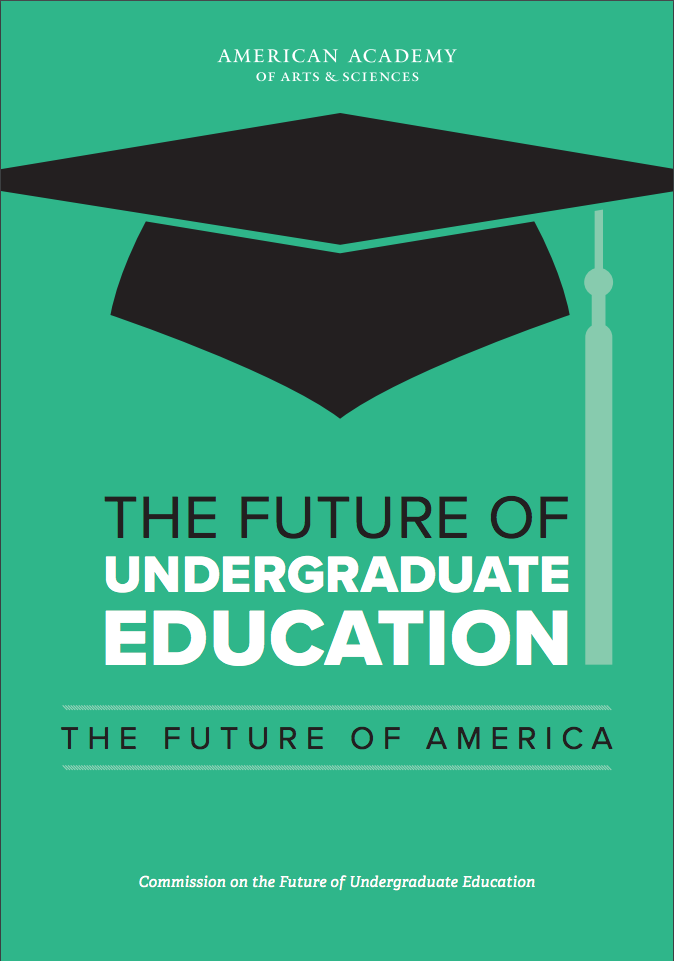
The Future of Undergraduate Education
“Institutions need to devote far more attention to and support for the quality of teaching and the teaching workforce and become more purposeful, effective, and efficient—reengineering their systems to focus on student completion,” says the American Academy of Arts & Sciences in its new report, The Future of Undergraduate Education, The Future of America.
This important publication embraces higher education’s responsibility to ensure that all college students receive the education they require to be successful in the 21st century. The Academy’s esteemed Commission calls for:
- high-quality educational experiences for all students,
- increased completion rates and reduced inequities among student populations, and
- improved affordability of an undergraduate education.
Effective teaching is critical to creating high-quality educational experiences and improving completion rates, as “the richness and rigor of undergraduate learning depends upon the quality of instruction being offered.” According to the Commission,
“The primary determinant of a quality education is the teaching and learning relationship between faculty and students. Effective student/faculty interactions are correlated with increased retention and completion rates, better grades and standardized test scores, and higher career and graduate school aspirations. Quite simply, students learn more and fail less when faculty members consult and utilize a large and growing body of research about effective teaching methods and make connections with students.”
But good teaching is often “undervalued.” The Commission notes that “faculty are rarely trained, selected, and assessed as teachers, and their effectiveness as instructors is rarely recognized or rewarded.” The report calls for increased attention “to elevate the importance of good teaching,” to regard teaching “as a central skill to be developed and supported,” and to increase professional development opportunities for graduate students through full-time faculty:
“To meet these new requirements—to pursue research-based teaching methodologies and to facilitate open dialogue in the classroom—college faculty may need to conceive of their roles in fundamentally new ways. The transformation of a teaching workforce rooted in disciplinary expertise to include pedagogical expertise will not be easy. Emerging research on the science of learning cannot simply be disseminated with the hope that doing so will improve outcomes. The research needs to be reinforced by new professional development opportunities at every level, including ‘preservice preparation’—in which pedagogy becomes a significant component of graduate training— and ‘in-service’ professional development providing ongoing evaluation and support.”
The Academy’s unalloyed support for quality teaching joins the chorus of voices from the Educational Testing Service, the Association of American Universities, Derek Bok, president emeritus of Harvard University, and others.
ACUE commends our partner colleges and universities who are also on the leading edge of this work. Nationwide, the transformation that has occurred in our workplaces and in society demands a commensurate transformation in higher education, and ACUE is honored to be a part of this important change.
The Future of Undergraduate Education
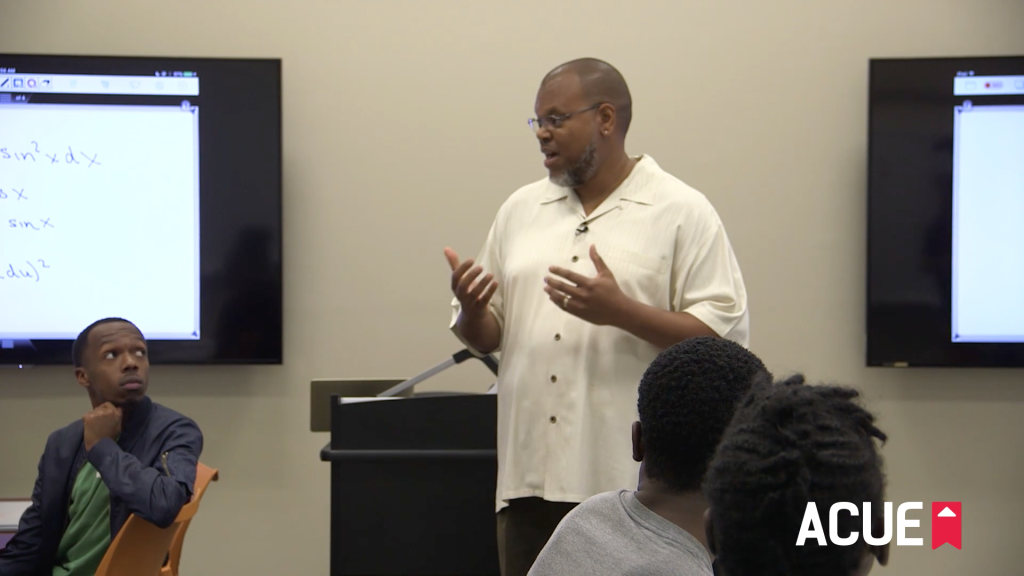
News Roundup: Addressing Knowledge Gaps, Avoiding Burnout
Instructors discuss how to address students’ knowledge gaps in their subjects and avoid burnout when teaching online.
| News and insights delivered to your inbox every week: The Q Newsletter. |
Breaking the Cycle of Knowledge Gaps
Noting that many students have gaps in fundamental knowledge needed to complete assignments, Andrea Suria administers ungraded preassessments to gauge students’ skill levels. She also welcomes questions, encourages students to use the tutoring centers, and designates time for reflection, so students can think about what they’re learning. (UConn)
How to Escape Grading Jail
To reduce the time involved in end-of-semester grading (and improve the quality of his feedback), Kevin Gannon creates calendars at the beginning of the semester identifying all due dates, employs rubrics to facilitate commentary on common mistakes, and uses recording apps to provide students with audio feedback about their work. (Vitae)
Top Skills Career-Minded Students Need in Today’s Digital Workforce
Today’s college students should possess four key skills to stand out in the career marketplace, according to Frank Connolly: critical thinking, business communications, social skills, and creativity. (eCampus News)
How Online Instructors Can Avoid ‘Burnout’
Job stress can be especially common among online instructors, according to Rebecca Stout, since they often feel like they must be available to students 24/7 and often work in isolation. To prevent burnout, she calls on institutions to encourage their online faculty to unplug and take care of themselves. (EdSurge)
Incentives for Course Evaluations
One study shows that when students received micro-incentives to complete course evaluations, they did so at a higher rate than previously, and the quality of the evaluations remained consistent. Citing this study, Cindy Nebel suggests instructors promise a small amount of extra credit to students who fill out end-of-semester evaluations. (The Learning Scientists)
Conduit v. Catalyst: Ideology in the Classroom
John Warner sees his role as a catalyst for learning rather than a conduit to his course material. He suggests that the less authority he wields over students, the more they learn, and students should have as much, if not more, say in shaping the course as the instructor. (Just Visiting)
Partner News
Eduardo Padrón: Miami Dade College president wins lifetime achievement award (Miami Herald)
University of Southern Mississippi: Southern Miss named top 20 university for veterans (WDAM)
Grammar Girl on Lessons from ACUE
Faculty Spotlight: Mignon Fogarty, Grammar Girl Creator
Mignon Fogarty is the creator and host of the Grammar Girl website and the author of seven books on language, including the New York Times bestseller Grammar Girl’s Quick and Dirty Tips for Better Writing. She produces 52 podcasts per year, has been featured on NPR and the TODAY Show, and is a regular contributor to the Scripps National Spelling Bee’s newsletter. She also created an iOS game called Grammar Pop.
Mignon participated in ACUE’s program with the University of Nevada, Reno. She kicks off the first Faculty Spotlight column by sharing three key takeaways from the course and a word of advice for new instructors.
Teaching is one of the hardest things I’ve ever done. I believe new teachers should find a mentor, ask all the questions they can, and get all the training that’s available. The great teachers I encountered all did things differently, and I did some things differently from them. But between talking with great teachers and taking the ACUE course, I was able to find techniques that worked for me. Below are a few of my “big-picture” lessons from the ACUE course.
Adjusting to Meet Students’ Needs
The “Motivating Your Students” and “Using Active Learning Techniques in Large Classes” modules were especially helpful. While completing the ACUE course, I started using exit tickets in my classes to get a sense of what the students had learned that day and what had been confusing. It was enlightening and helped me adjust future class sessions to meet students’ needs. It also seemed to make the students feel more engaged and heard, and it helped me understand the needs of the quiet students better. It’s always easy to know what the vocal students understand or want, but giving the quiet students a chance to write down their thoughts helped.
Teaching Rather Than “Covering” Content
One big-picture lesson I found helpful was to focus on engagement and understanding. As a new teacher, I was trying to fit as much information as I possibly could into my classes. The ACUE course encouraged me to slow down and realize that it was better to spend time reinforcing lessons to make sure students understood what I was teaching them than to tell students everything once and expect them to remember.
Helping Students Learn Together
After completing the “Providing Useful Feedback” module, I tried peer editing in one of my courses and found it to be useful. That was part of another big-picture lesson: that I didn’t have to do everything myself because, with guidance, the students could learn from each other. Students seemed to value one another’s feedback, and the peer-review process allowed students to get immediate feedback that could help them revise for a final grade.
To learn more about Mignon Fogarty and listen to the Grammar Girl podcast, visit http://www.quickanddirtytips.com/grammar-girl
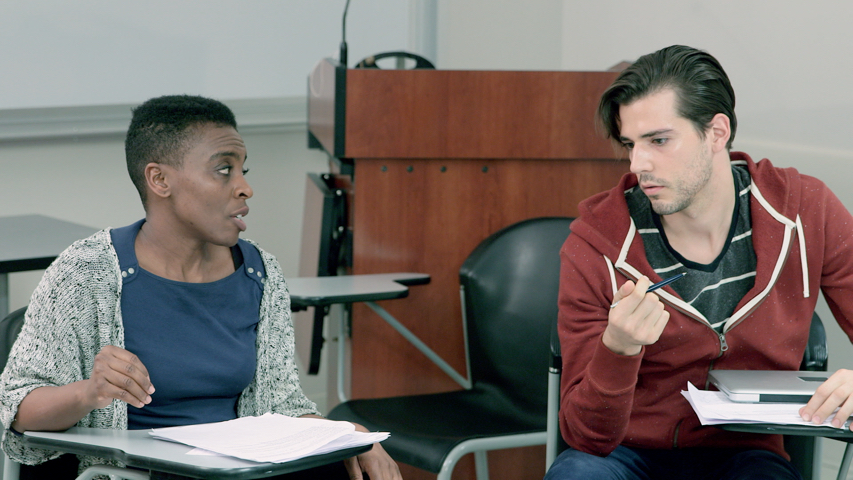
News Roundup: Learning From Students
As the semester draws to a close, find out how instructors are learning from students who observe and asses their teaching practices. Plus, read about the ways faculty are engaging students, from visuals to blogging for real-world audiences.
| Sign up for The Q Newsletter for weekly news and insights. |
What Professors Can Learn About Teaching From Their Students
At the University of California at Merced, specially trained undergraduates observe instructors’ teaching and interview course-takers in order to provide faculty with feedback that informs their instructional practices. (The Chronicle of Higher Education – Paywall)
Classroom Strategies Engage “the New Majority”
Faculty employ research-based methods to promote success among first-generation and low-income students at Heritage University’s Institute for Student Identity and Success. Using exercises such as guided journaling, instructors encourage students to take ownership of their learning and gain confidence in the classroom. (Higher Ed Jobs)
6 Reasons Why Course Visuals Are a Must for Today’s College Students
More than ever before, students have choices in how they wish to learn. Ryan Eash advocates using visuals to engage learners. He describes six methods, from preparing infographics or annotated screenshots that clarify confusing concepts to creating personalized introductory videos that humanize instructors of online courses. (eCampus News)
“Some People Are Just Born Good Writers”
Good writing can be taught, Jill Parrott argues. She describes how instructors can teach students the art of writing by building their confidence and encouraging practice and reflection. She also suggests that assignments with a real-world component, such as blogging, help students consider their audience. (Inside Higher Ed)
We Don’t Need More Alternatives to College
With the advent of boot camps focused on career-based skills, Amy Ahearn suggests higher education blend its model with “bursts of career-focused training.” She points to new models that supplement a college education, rather than replace it, by focusing on career readiness and emphasizing the soft skills needed to land a high-quality job. (EdSurge)
